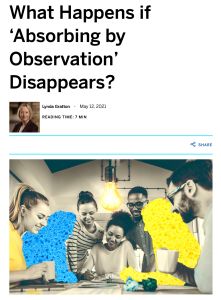Join getAbstract to access the summary!

Join getAbstract to access the summary!
Lynda Gratton
What Happens if ‘Absorbing by Observation’ Disappears?
MIT Sloan Management Review, 2021
What's inside?
Successful onboarding involves passing on tacit knowledge – even when new hires are not physically present.
Recommendation
Is your company seeking to integrate new hires more successfully – even when they’re working remotely? As professor of management Lynda Gratton explains, formal onboarding sessions cannot convey the subtle norms and tacit knowledge underlying work processes within a company. She describes innovative ways to assimilate new employees when they can’t be present in the office.
Summary
About the Author
Lynda Gratton is a professor of management practice at London Business School and founder of the advisory practice HSM.



















Comment on this summary